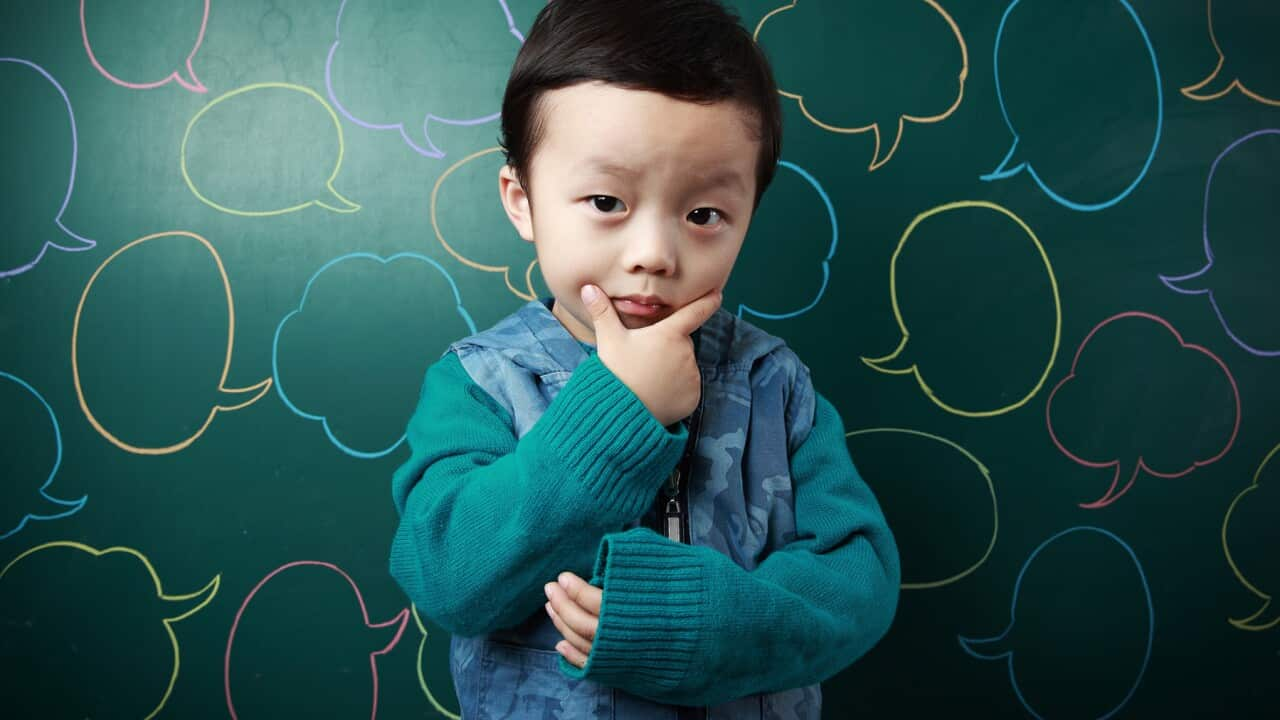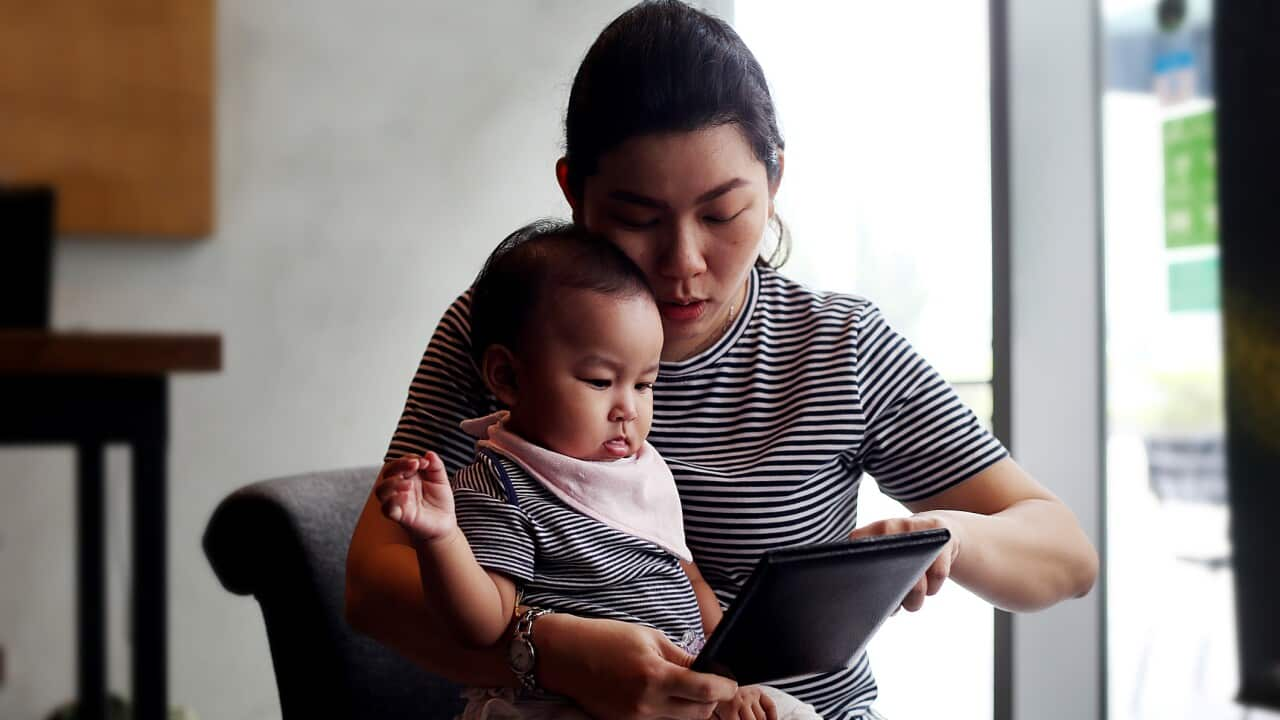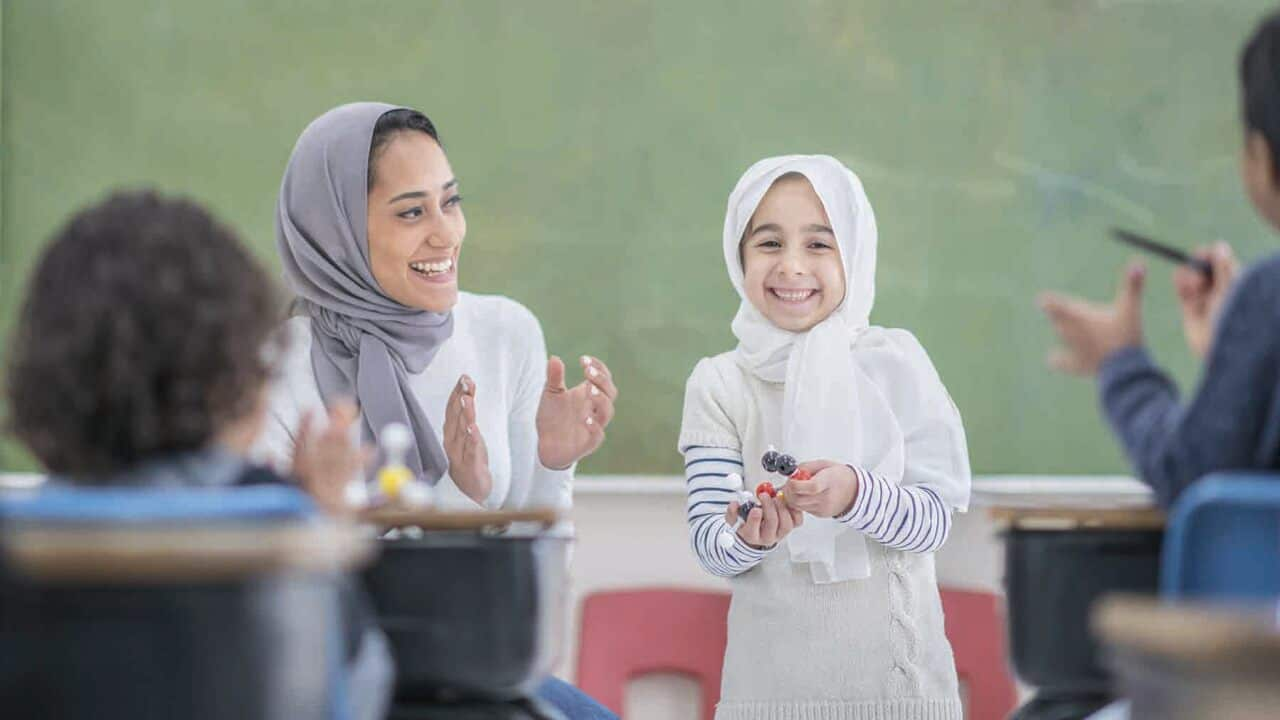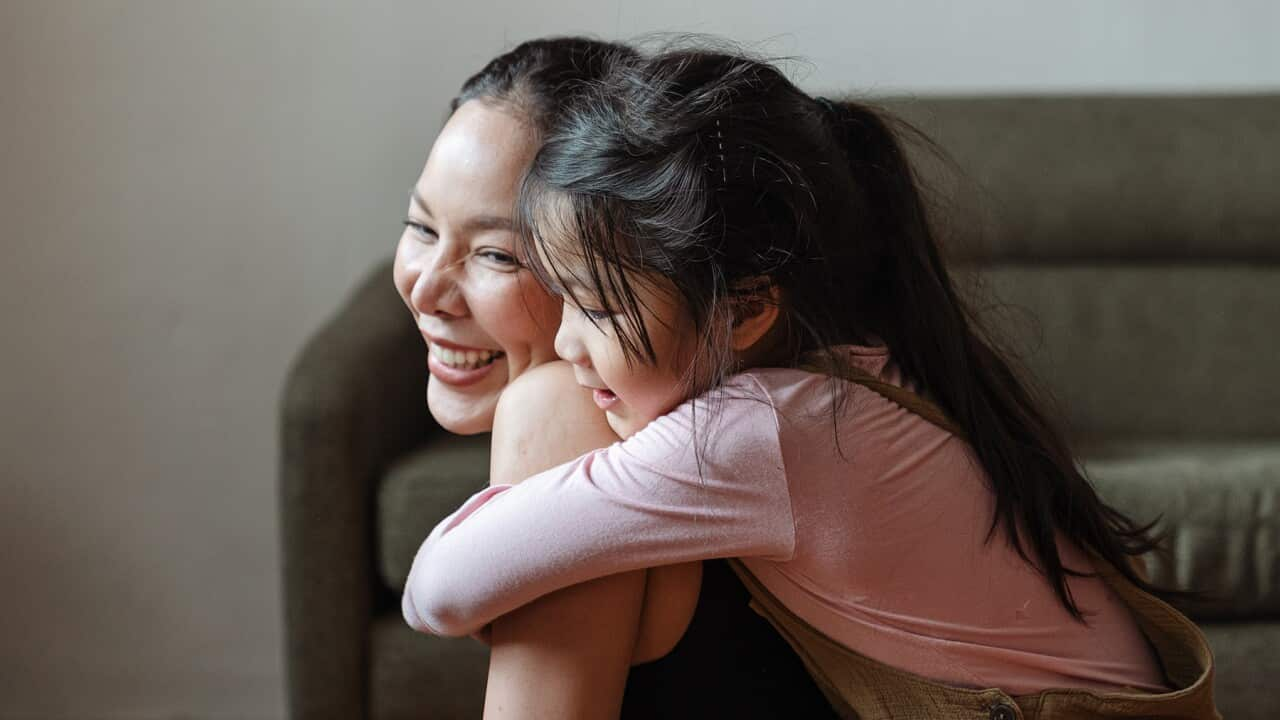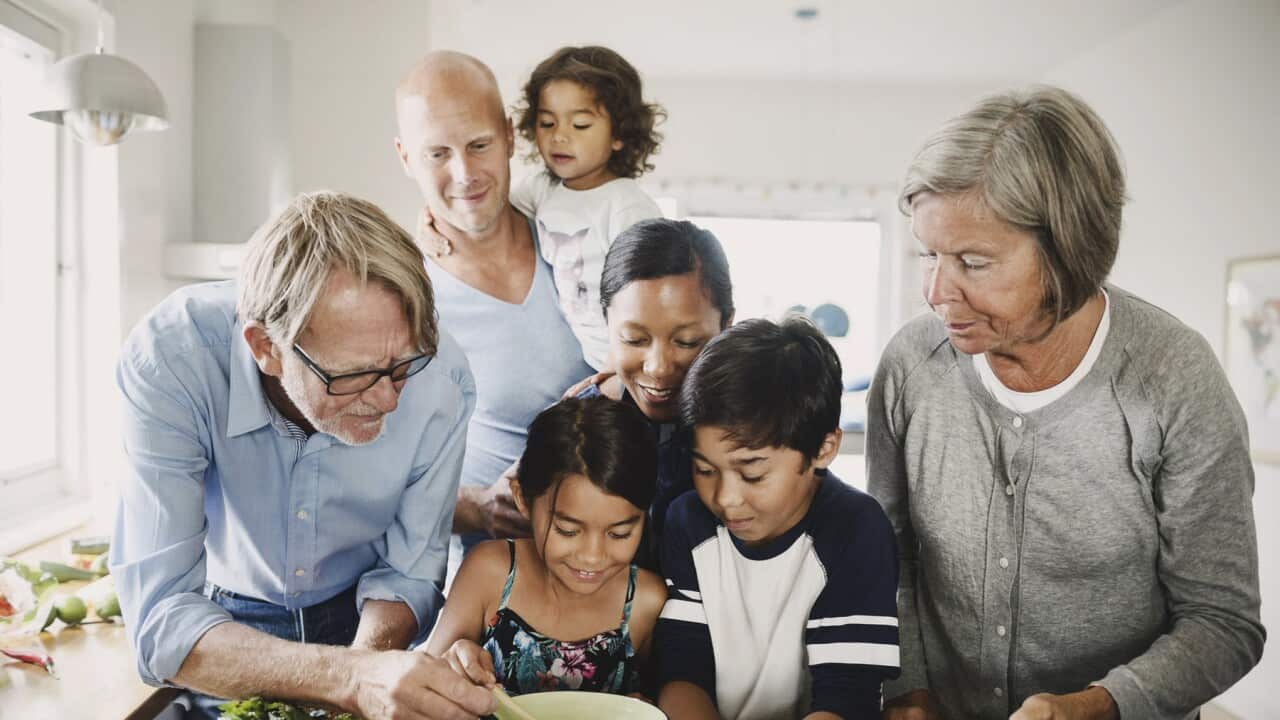Not all languages are treated equally, and if you speak a dialect or language which is from a smaller community, you already know this. And one effect of speaking a language with less status is less access to resources like books, media and classes.
When families choose to prioritise major languages it's often a pragmatic choice. It’s understandable why we are all so invested in making sure our children speak English well, given it has a lot of power as the language of globalisation. But having English at the top does not diminish the value of the rest of the world’s languages.
In episode five of , we look at the bigger picture with Professor Ingrid Piller, an applied sociolinguist with research expertise in multilingualism, bilingual education, language learning and intercultural communication. She helps us unpack what’s going on with families speaking languages such as Rohingya, Punjabi and Korean.
is hosted by Dr Elaine Laforteza. Produced by Masako Fukui and Sheila Ngoc Pham.
Follow in, Google Podcasts,, or the for more.
Transcript
We would like to acknowledge the Traditional Owners of the land we’re broadcasting from today, and we pay our respects to the Cammeraygal people of the Guringai Nation and their elders past and present. We also acknowledge the Traditional Owners from all Aboriginal and Torres Strait Islander lands you are listening from today.
Leah: I found that becoming bilingual or multilingual seems impossible without the process of feeling frustrated.
Maggie: It does bring up a bit of guilt I suppose that my Macedonian should be a bit better.
Cho: I believe some mother teaching Korean well, but I can't do it. So I feel like I'm not good enough mother.
ELAINE (host): That’s Chorong, and before her was Maggie and Leah. And I totally get how they’re all feeling… because no matter what we do as bilingual parents, it sometimes feels as though it’s just not enough, right?
Hello again, Elaine Laforteza here, welcoming you to My Bilingual Family.
In this episode, we’re taking a step back to look at the bigger picture. There are over 6000 languages in the world. But what forces determine which of these are considered more important? And how does this affect the everyday decisions we make as bilingual parents here in Australia? So glad you can join me for this discussion.
ELAINE: If you’ve been listening to this podcast from the beginning - and I hope you have - then you’ll remember we met SBS Korean producer Leah in Episode 2.
Leah: Hello. My name is Leah and I am a radio presenter and producer.
ELAINE: Her husband is Victor, and they have three children.
Leah: In terms of the languages, four languages have been running in our little house. My Korean, Victor’s Cantonese and Mandarin, and English for all of us.
ELAINE: Leah and Victor’s kids can all speak Korean, though the eldest now speaks mostly in English, since he started school.
Sound of Leah calling out and kids
Leah: If my Korean journey with my children is sort of half success and half failure, because so far, at least two out of three speak Korean. But Victor’s Chinese language journey with children is more like a failure… I’m so sorry to say that, I didn’t mean to hurt Victor but it is the fact that none of our children can speak fluent Cantonese or Mandarin. It is very sad that the children can’t talk to their grandparents in China because they love the kids so much and they’re keen to talk to them, but there is language barrier between our kids and grandparents.
Sound of Leah’s kids
Victor: So my name is Victor, I’m Leah’s husband. For me it’s a bit tricky, my background. Because I am from south China, and Guangdong region. Well, the city that I come from is called Dongguan, so I speak the Dongguan dialect of the Cantonese. Yeah, Cantonese is a difficult language to speak in contrast with the Mandarin, which is the official language of Chinese. I just want to give the kids a easier environment to start with, and that’s why we send them to the Mandarin school to start with first, because Mandarin is a common Chinese people speak. So after they understand, speak Mandarin, Cantonese can be further, I would say, study of the Chinese that they can have.
Sound of Leah’s kids
ELAINE: Rather than passing on his mother tongue, Victor’s teaching his kids the national language of China. That way, they can still maintain a connection to their dad’s homeland. I find Victor’s approach really intriguing, and to discuss this with me is Dr Ingrid Piller.
Ingrid: I'm Distinguished Professor of Applied Linguistics at Macquarie University.
If I remember Victor's situation correctly he actually had three languages in the family, right?
Elaine: Yes.
Ingrid: There is English of course so that's a lot of languages. And I don't think there are actually all that many Cantonese schools in Australia. And so, I think that's the approach he has to take if he wants to maintain that language. And of course one of the important things about learning Mandarin is actually being able to learn how to read and write, get familiar with the characters. That of course is the same for the two languages and so it's certainly a good start. I guess when he says he wants to start his kids off with Mandarin, what he means is actually sending them to school once they are a bit older, so he's presumably not talking about babies. Babyhood, I wouldn't start with a language that’s maybe a learned language because you want to establish a language that gives you an emotional connection with your children, right?
Elaine: I just wanted to clarify, you said when it's that babyhood stage, not to structure language learning as such, and just to speak it naturally; but as kids get older, that's when the structure comes and when the choices have to be made?
Ingrid: Yeah, that's right. Because, look, I mean when you have a new baby, you've got so many things to think about, right? You want to make sure they are well fed, you get enough sleep as a parent. And you just reorganise your family with that new person. What you do there is you chat to your child all the time in a particular language.
Elaine talking to her son in Ilocano
Ingrid: That actually is the first foundation of language learning.
Elaine talking to her son in Ilocano
ELAINE: Well, that makes sense then that Leah and Victor’s children speak more Korean, because like me, Leah’s been the primary caregiver in those early years. In fact, there’s even evidence that the foundations of language learning begin in the womb. So our ‘mother language’ is truly the first language we encounter and form an emotional attachment to.
But there’s another reason maintaining Victor’s language is a bit tricky. And it has nothing to do with him not having a womb…it’s got to do with the relationship between his Dongguan dialect and Mandarin, within the ‘global hierarchy’ of languages.
Ingrid: Look, a good way to think about the relationships between different languages is to think about them in terms of a pyramid. Out of the around 6000 languages in the world, probably 90 percent are at the bottom of the pyramid. All those languages that people use in their local community. So these are spoken languages, and they don't have any official status.
ELAINE: So Victor’s Dongguan dialect, as well as my language, Ilocano from the Philippines, are towards the bottom of that pyramid.
Ingrid: And above this very large layer of spoken languages sits a smaller layer of languages that have official status somewhere, usually a nation state but it could also be an institution, so they have some role in formal education, maybe in the media of a country. And there are about a hundred or so languages.
ELAINE: These are mostly national languages, like Korean or Greek or Vietnamese…
Ingrid: On top of those sits another dozen languages that are international languages that are used in international communication...
ELAINE: And these are bigger languages like the ones used by the UN - Arabic, Spanish, Mandarin…
Ingrid: And on the top of that language pyramid sits one single language only; and that one single language today is English as the hypercentral language of globalisation. And English sits on top because pretty much everyone in the world in order to communicate globally they need English. And so that gives English a really, really special status.
ELAINE: So it’s easy to understand why we put so much emphasis on English. And why some parents prioritise English over their own languages, because it is that linguistic passport to all kinds of opportunities.
Ingrid: Going back to Mandarin and Cantonese. You will often hear people say about Cantonese for instance that it’s just a dialect of Chinese. Now, in terms of linguistics that's completely wrong because Cantonese and Mandarin are not mutually intelligible. This comes back to questions of power because as linguist Weinreich famously said ‘a language is a dialect with an army and a navy.’
Elaine: Oh wow…
Ingrid: You know there is the power of the Chinese state that subsumes all the languages within the Chinese state as dialects of Chinese so that's a way to establish prestige. And Elaine, I'm sure you will have heard the same that some people will say Ilocano is just a dialect?
Elaine: Hmm, frequently.
Ingrid: Again, that's a result of how the language is constructed relative to the nation.
ELAINE: So I have an admission to make - in my life before this podcast…I used to refer to my mother tongue, Ilocano, as a dialect rather than a language. And this is something that I’ve heard other Filipinos do as well. Now I know better!
Elaine and her mum chatting in Ilocano
The Ilocano I’m trying to pass on is the language I mostly speak with my mum. It’s my way of connecting to my mum, and for my kids to know this part of me deeply.
Elaine and her mum chatting in Ilocano
Throughout my childhood, my mum and I lived on different continents: Asia, North America, Europe, and now, Australia. Languages, people, cultures and rules changed. But Ilocano was our constant. It’s our go-to language when we’re tired of adapting to different cultures.It’s how we wind down, especially with our favourite Ilocano song, the classic, Manang Biday. My mum taught me this song and an R rated version of it as well! (sings) I’m not going to sing the rest!
Song: Manang Biday
So, speaking and singing in Ilocano for me is all of this - my connection to family, humour, and joy. Ilocano isn’t just what I say, it’s who I am. I am Ilocano. It’s my cultural identity and heritage, but it’s also so much more than that.
Song: Manang Biday
ELAINE: As the host of My Bilingual Family, I’ve been able to speak my language for the first time publicly, and that’s been really emotional for me. I always thought Ilocano didn’t belong in my professional life. But knowing about this global hierarchy of languages, I now understand that I put Ilocano lower than the other languages I speak, even though it’s the language that makes me feel complete.
Given we live in Australia, where my kids will learn English at school, I’m determined to make sure they grow up with Ilocano. But it’s a small language, and desperately under-resourced. I think I’ve bought all the Ilocano kids’ books available online! And there’s definitely no Bluey or Peppa Pig in Ilocano! So what can parents like me do?
Ingrid: I think it's important to actually recognise where your language sort of sits in the hierarchy because the languages at the bottom of the pyramid, they are typically spoken languages. Even if they have a script, very often there isn't much written material. And if there aren't a whole lot of formal language schools available, and a whole lot of material on the internet, then you need to get other people in to speak with your child in that language. So you can't do it alone.
You know this saying it takes a village to raise a child. You really need extended family, you need friends, you need community. So if you are ready to maintain those community connections then you know, I think you have every chance to develop fluency in your child. If on the other hand you kind of feel like I don't actually want to hang out with other Ilocano speakers, you know I mean then that's a different story. And your kids can still have some phrases, and a general appreciation of the language and culture, but they might not get very proficient
ELAINE: The migrant languages that are going strong after more than a few generations in Australia are almost all languages of people who have a strong sense of community.
But for speakers of languages new to Australia, like Rohingya, finding a community may pose additional challenges. Let’s hang out for a bit with SBS Rohingya producer Yasmeen, while she pays a visit to her friend Asma.
Yasmeen: We have been talking on the phone lately about our language, which is Rohingya language, our mother tongue I mean, which is a very small language and there is no much uses in much part of the world. What do you think like about our language? Do you think it's an important language?
Asma: Of course, I think it's very important because our Rohingyan language, our ethnic community, and in the world before people doesn't know about that much. Now is I think it’s a little bit more popular than before. So I wish our kids can speak Rohingyan language better.
Yasmeen: But what benefit they're going to get?
Asma: Because this is your ethnic community, your Rohingya language, your mother tongue.
Yasmeen: So for you, you think our Rohingya language is our identity. So if someone can speak Rohingya language straight away, we will know that that is our identity, isn’t it.
Asma: Yeah. In Australia. like an immigration interview, they give it to you at the end some kind of like 1-2 minute question with the Rohingya. So proof this is real Rohingya. Because most of the Rohingya doesn't have an ID from our country. So you need to prove if you can speak Rohingyan, then you are actual Rohingyan…
Yasmeen: so that’s to prove your identity…
Asma: …to prove your identity, yeah.
Ingrid: Of course they will be battling with much fewer resources than the more established migrant communities, because one thing that established migrant communities have been able to achieve is actually to set up all kinds of community schools. So there is within Australia a local infrastructure that supports particular language groups, and the newer migrant communities may just be building those resources in an environment that is far less supportive of multiculturalism than may have been the case in the final decades of the twentieth century for instance. And so that really is a challenge for them.
ELAINE: This challenge is being felt by many bilingual families, including Bhupinder and Harminder.
Bhupinder: My husband and I grew up in Rajasthan. So as well as Punjabi, we can also proficiently communicate in Rajasthani dialect of Hindi. But our children have grown up here in Sydney, where we must use English outside our home, but a homely environment is completely Punjabi. We always made sure that when our children come home, that we talked to them in Punjabi language. So they know that okay, outside our home is a English environment, and inside our home is Punjabi environment.
ELAINE: That’s Bhupinder, and she’s describing a bilingual parenting method which I think of as inside/outside. Inside is the home language, and outside is English. And both their teenage kids speak Punjabi, so it’s gone well for their family, to a degree…
Bhupinder: I feel for them because when they go outside in their school, they are known as ‘English as a second language’ children. Here also they are told that you’re learning Punjabi as your second language. So they are a bit confused, they’re standing in the middle. They need support. They need to feel confidence.
Harminder: This next generation, it will be finished. Very hard, very hard. In the next 20 years it will be very hard, unless or until they go to Punjab, and stay over there.
ELAINE: Harminder’s dire prediction, that in the next generation, Punjabi will be lost in his family, is sadly, likely to come true…
Ingrid: The typical pattern of multilingualism in Australia is that by the third generation. we usually see that the home language has disappeared. And that's why Australia has been called a graveyard of languages. People are actually right to be somewhat pessimistic about the prospects of maintaining their home language in the long term because the point of language is for us to connect and to communicate with other people. So if you are doing that as an individual it's the one hand clapping or something. So you need at least another hand to clap. So that's really where a language policy, strong languages in schooling come in.
At the moment what we do in Australia is we have bilingual kids, you know up until five years old or so. But as soon as they start school, that's where the real challenge starts. So we have those multilingual kids coming into schools and we turn them into English monolinguals and then, we sort of have a couple of hours per week and try to teach them some other language and it doesn't work very well. So we've really got to get better at that.
ELAINE: This is exactly what’s happening at my daughter’s school. She’s just starting Italian. But it would be more helpful for me if the school supported her Ilocano learning. But I know that’s never going to happen.
And that’s because of the place English has in that language pyramid. Ingrid called it ‘the hypercentral language of globalisation’.
English gives us access to the world, so we’ve grown lazy here in Australia. We don’t bother with the other languages we have because we’ve developed this mindset that languages other than English are not as important.
Before this podcast, I used to say that Australia is a monolingual country - but we’re totally not. We’re multilingual. What we do have is a ‘monolingual mindset’.
This mindset influences not just school language policies, but our access to healthcare and services, the media, and immigration. And for parents like me, and you, it means we get little institutional support to maintain our languages.
Julia: (Self introduction in Korean.)
Hi, my name is Julia, I’m a mother of two. I have a twelve-year-old son and an eight-year-old daughter. And my husband is from Norway.
So when I first had my child, my husband and I decided to do this One Parent One Language thing where I spoke in Korean exclusively and my husband used Norwegian only. And that went pretty well for the first few years, but as soon as my number two came and things got a bit crazy, unfortunately Norwegian went out. Yeah, now we are focusing just on trying to keep his Korean and her Korean up.
I noticed that at home I would say pretty much the same things all the time. I found that if I brought him outside, he would be more exposed to more people speaking the language. I would seek out Korean teachers who would teach art, his first piano teacher was Korean as well. So yeah, I try to keep as many Korean activities as I could. He attended Korean school during weekends.
Without my noticing it I think I have sort of developed this community around us that are quite heavily Korean. Sometimes I wonder if I am kind of making this bubble and if that’s healthy or not. So I wonder if he goes out to the real world, if he would have a shock, that actually the world isn’t full of Korean Australians.
Ingrid: Australia is a complex diverse nation, consisting of many little real worlds and communities and what is important I think for us to be successful as a strong multicultural, cohesive, diverse nation is actually to be grounded in our neighbourhoods, in our communities and form strong personal connections with the people with who we live, our colleagues, our neighbours, our friends. And that is the basis on which we then can go out to other neighbourhoods, and where we all meet as equals. And the strength of a nation is really built on all those little real worlds where we support each other, with our different languages and cultures.
ELAINE: You know Julia, I had quite a long chat with my two producers about your ‘bubble’. And all three of us felt that what you’ve created for your kids is a really healthy sense of identity - and that’s going to help them navigate the world successfully when they’re older. It feels especially impressive given your kids grew up in a mixed-language home.
Now it seems to me you’ve done all the right things. You've created this community of Korean speakers around you. Because as Ingrid pointed out, we can’t do this on our own. And I’m wondering if you’re feeling tentative because you’re actually challenging the powerful dominance of English? We need to remember that this status quo is just a ‘mindset’. The real world is where we speak 300 or more languages. Maybe that sense of uneasiness is actually the weight of that pyramid? Even if we agree that English and the bigger languages at the top of that pyramid are worth knowing, that doesn’t mean the languages at the bottom are less important.
And in our next and final (yes final!) episode, gonna miss this. We’re going to talk to a number of people who know that our languages are important. Like Julia, they’ve created strong communities of support around them.
Thanks to all the people who shared their stories with us, and to SBS Punjabi producer MP Singh for interviewing Bhuphinder and Harminder. Also, special thanks to Aimee Ipson-Pflederer for introducing us to Julia.
And thanks to my mum, Maria Eleanor, for being such a great sport and singing with me!
We really appreciate everyone who has emailed us - it really validates how much our stories need to be shared - so a BIG thank you for sharing yours. And we’ll answer some of the questions you’ve asked us in our next episode.
So until then, paalam, goodbye from me, Elaine Laforteza. And thanks for listening to My Bilingual Family.

